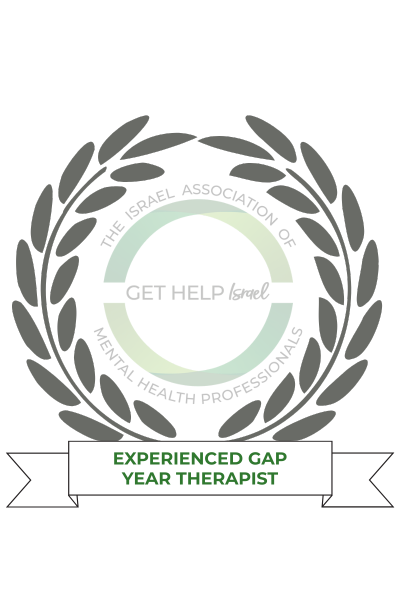Uri Wolf
Credentials
Finances
Licensed in Israel
Licensed Abroad
- 38 Nahar HaYarkon
- Bet Shemesh
- 16 Hartom
- Jerusalem
- Telepsychiatry
- Anywhere in Israel
- Email Me
-
 Business HoursEveningsFridays/Weekends
Business HoursEveningsFridays/Weekends
Uri Wolf
 Verified
Verified
Credentials
Psychiatrist
MD
Finances
700+ NIS
None
N/A
- 38 Nahar HaYarkon
- Bet Shemesh
- 16 Hartom
- Jerusalem
- Telepsychiatry
- Anywhere in Israel
ABOUT THE THERAPIST
I am a psychiatrist practicing in both Canada and Israel. I strive to make the assessment and treatment process as comfortable and meaningful as possible. I have offices in both Jerusalem and Beit Shemesh. I am also available for virtual assessments from anywhere in Israel.
I work with adults to assess and treat people facing various mood and anxiety challenges such as depression, bipolar disorder, generalized anxiety disorder, panic attacks, OCD, PTSD, and ADHD. I believe that collaborating with families and other care providers is key to successful treatment.
In addition to treating adults of all ages, I also have a special interest in geriatric psychiatry and cognitive disorders, such as dementia and mild cognitive impairment. I also specialize in people with neurological disorders causing cognitive or other mental health struggles (neuropsychiatry).
In addition to being certified as a psychiatrist in Israel, I am also certified by the Royal College of Physicians and Surgeons of Canada as a General and Geriatric Psychiatrist. I also have additional certification in Behavioral Neurology and Neuropsychiatry from the United Council for Neurological Subspecialties.
I completed my medical and psychiatry training at the University of Toronto. Prior to relocating to Israel in 2022, I held an academic and teaching appointment to the University of Toronto as Assistant Professor. I authored over a dozen publications relating to dementia and other neuropsychiatric conditions. I have also lectured widely on a range of mental health topics.
In Toronto, Canada, I was a staff physician at the Baycrest Center for Geriatric Care. At this prestigious institution, I was a member of the specialized memory clinic and inpatient dementia unit and helped develop a virtual model of treating people with dementia.
I worked in a private practice specializing in general adult psychiatry and occupational psychiatry. I have been the medical director of Relief Resources-Canada, a mental health referral and support organization, since 2010.
QUALIFICATIONS
MD
University of Toronto
2005
Degree
MDEducation
University of TorontoYear of Graduation
2005Years in Practice
19
LICENSED IN ISRAEL
Psychiatry License Number
1-173198
LICENSED ABROAD
License Category
PsychiatristLicense Number
83084 - OntarioDISTANCE COUNSELING
Online Therapy
PRIMARY SPECIALTIES
Alzheimers / Dementia
Anxiety / Panic
Depression
Mood Disorders
Obsessive Compulsive Disorder (OCD)
ADDITIONAL SPECIALTIES
Geriatric Psychiatry/ Neuropsychiatry
CLIENT FOCUS
Population
Adults
Men
Women
Geriatric
Languages Spoken
Hebrew
English
TREATMENT APPROACH
Cognitive Behavioral Therapy (CBT)Cognitive Behavioral Therapy (CBT) is a type of psychotherapy that focuses on how one's thoughts, feelings and behaviors are connected and can be changed. It is based on the idea that how we think (cognition) and how we feel (emotion) can influence how we behave. CBT helps people identify and challenge distorted thinking and replace it with more balanced thinking, leading to improved mood and behavior. ‘Homework’, usually containing practical writing exercises, is often completed by the client between sessions to reinforce the therapy. Examples of tools that practitioners often use are journaling, challenging beliefs, and mindfulness.
Psychodynamic TherapyPsychodynamic therapy is a form of therapy that focuses on the unconscious mind and how it affects behavior. It works to help people understand and work through past experiences and feelings that may be causing difficulties in the present. This type of therapy encourages individuals to explore their emotions, relationships, and behaviors in order to gain insight into their current difficulties. It can help individuals better understand themselves and their motivations, and gain insight into how past events have impacted their current lives. People tend to develop defense mechanisms when faced with challenges in life. Defense mechanisms may keep painful feelings, memories, and experiences in the unconscious. A few common defense mechanisms include: denial, repression, and rationalization. Psychodynamic therapists encourage people to speak freely about their emotions, desires, and fears. Being open may help uncover vulnerable feelings that have been pushed out of conscious awareness. According to psychodynamic theory, behavior is influenced by unconscious thought. Once painful feelings are brought forth and processed, the defense mechanisms are no longer needed and a person in treatment can start changing unhelpful patterns when coping with life’s challenges.
SERVICES OFFERED
Consultation
Medication Management
Psychiatric Evaluation

Therapist's Experience with Gap Year Students
I have worked with Yeshiva and Seminary students for over 15 years. I strive to make the assessment and treatment process as comfortable and meaningful as possible. I believe that, when possible, collaborating with families, principals and teachers, and other care providers is key to successful treatment.
.jpeg)
 Verified
Verified


